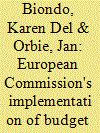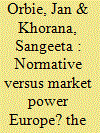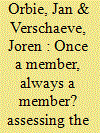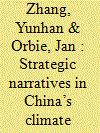|
|
|
Sort Order |
|
|
|
Items / Page
|
|
|
|
|
|
|
| Srl | Item |
| 1 |
ID:
131373


|
|
|
|
|
| Publication |
2014.
|
| Summary/Abstract |
The complex relationship between democracy and development has been extensively discussed in academic literature. However, we do not have much knowledge of how this translates into donor practices. How does the European Commission (EC) deal with tensions arising from promoting democracy and development? To answer this question, this article operationalises the distinction between 'democracy promoters' and 'developmental donors', focusing specifically on budget support and governance incentive tranches. Empirically we examine the implementation of the EC's budget support and Governance Incentive Tranche in Ethiopia (2005-10), a case where the dilemma between democracy promotion and development cooperation is particularly strong. Investigating the position of the EC along the democracy promoter versus developmental donor continuum, we conclude that the EC's position lies between these extremes. However, in the case of budget support, a shift has been made away from the Commission being a democracy promoter and towards the role of developmental donor.
|
|
|
|
|
|
|
|
|
|
|
|
|
|
|
|
| 2 |
ID:
191673


|
|
|
|
|
| Summary/Abstract |
Academic and policy interest in civil society participation in the European Union’s trade policy has been growing since the late 1990s. We analyse civil society’s engagement with the Domestic Advisory Groups (DAGs)—consultation mechanisms established by the European Commission at the implementation stage of its free trade agreements. While the Commission’s formal rationale for the DAGs is partnership with civil society, in fact this relationship involves a marked power and resistance dynamic. We focus on civil society’s agency and resistance, develop a conceptual framework laying out different possible types of resistance, and empirically demonstrate the wealth of both overt and subtle resistance practices employed by DAG members. Most of this resistance is (moderately) comprehensive and directed against the DAGs’ rationalities and technologies. While showing that DAGs are deeply contested, our study also provides a nuanced analysis of resistance with particular attention for divisions between business and non-business members.
|
|
|
|
|
|
|
|
|
|
|
|
|
|
|
|
| 3 |
ID:
144984


|
|
|
|
|
| Summary/Abstract |
The normative power Europe concept has greatly enriched the academic debate on what the EU is (should be), what it does (should do) and what impact it has (should have). However, various theoretical, methodological and empirical issues remain insufficiently addressed. This article will address two issues that have mostly been neglected: the perspective of the norm takers (in line with this special issue) and the market norms of the EU. The first section elaborates on these two issues, relying on recent advances in the literature and specifically the contributions by Damro (J Eur Publ Pol 19(5):682–699, 2012) and Rosamond (Brit J Polit Int Relat 16(1):133–148, 2013). Against this background, the second section examines the controversial EU trade negotiations with India. Specifically, this empirical part section focuses on how market liberal norms (government procurement) and cosmopolitan norms (human rights) are being promoted and received. We conclude that in the eyes of the EU, trade agreements could be a means to mitigate partners’ opposition and an eventual stepping stone for successful off-take of international social standards and multilateral procurement liberalization regulations by its partner countries. But, partner countries might not necessarily espouse the EU’s interest-led motivation and lend support to the EU’s desire to effuse multilateral norms through trading agreements. The case study on EU-India trade talks illustrates this, highlighting the divergence between the EU and Indian perspectives and demonstrates India’s lack of enthusiasm to adopt the EU’s preferred model for liberalization.
|
|
|
|
|
|
|
|
|
|
|
|
|
|
|
|
| 4 |
ID:
147962


|
|
|
|
|
| Summary/Abstract |
This article examines the European Union's (EU's) full membership of the Development Assistance Committee (DAC) of the Organisation for Economic Co-operation and Development (OECD). More specifically, we address (1) why the EU became a full member of the DAC in 1961, long before the EU was granted legal competences for development policy, and (2) why this membership status has remained unaltered over the past half-century, despite persistent dissatisfaction among both EU and non-EU members of the DAC. By applying historical institutionalism, we find that the initial decision on the EU's membership status in the DAC created a path dependence that was impossible to reverse afterwards, despite changing internal and external circumstances.
|
|
|
|
|
|
|
|
|
|
|
|
|
|
|
|
| 5 |
ID:
137081


|
|
|
|
|
| Summary/Abstract |
If democracy promotion is a ‘fashionable international art’ (Burnell 2000, 339), then there are many artists involved in it. It is impressive to observe, for instance, how the voices that offered assistance in the course of the Arab Spring appeared to sing from the same hymn sheet:
The EU [European Union] stands ready to assist the countries of the Arab spring to achieve deep democracy and the rule of law based on full respect of human rights and fundamental freedoms, but also economic development and social justice. (Council of the EU 2011a)
First, it will be the policy of the United States [US] to promote reform across the region, and to support transitions to democracy. (Obama 2011)
Once again, let me say: we are at an historic moment. Democracy is on the march across the Arab world. It is in the interest of the international community and the United Nations [UN] to help you on your way. (Ban Ki-moon 2011)
|
|
|
|
|
|
|
|
|
|
|
|
|
|
|
|
| 6 |
ID:
177663


|
|
|
|
|
| Summary/Abstract |
During the past decade, we have witnessed a transformation in the role played by China in international climate negotiations, which has provoked increasing academic and policy interest. While most of the current research focuses on normative or empirical analyses of policies, this article provides a comprehensive study of China’s climate strategic narratives on both the systematic and national levels. Theoretically, this article situates itself in the ‘narrative turn’ in international relations. We develop an analytical framework that combines theoretical insights stemming from the strategic narrative with our own identification of the unique features of China’s discourse context. We apply this to China’s climate strategic narratives by examining China’s climate ‘discourse coalition’, which consists of the government, the epistemic community, and the official media. In doing so, we add to the current research that mainly focuses on the mass media. Methodologically, we critically examine four different sources of China’s climate strategic narratives, ranging from leaders’ speeches to media reports. This data is triangulated with 21 semi-structured interviews. Overall, we identify three phases of China’s climate strategic narratives. On a system level, the strict division between developed and developing countries has been replaced by the narrative of ‘a community of a shared future of mankind’; while on the national level, China as the victim of ‘ecological imperialism’ has given way to the new ‘torchbearer’ narrative. This research also contributes to a broader understanding on China’s domestic politics and its position in global governance.
|
|
|
|
|
|
|
|
|
|
|
|
|
|
|
|
|
|
|
|
|